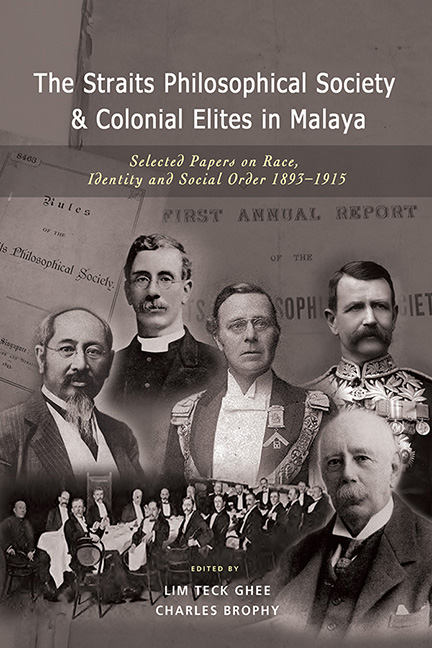 The Straits Philosophical Society and Colonial Elites in Malaya
The Straits Philosophical Society and Colonial Elites in Malaya Published online by Cambridge University Press: 09 January 2024
This book has had an unusually long gestation period. It all started in 1976 when Lim Teck Ghee, at that time teaching at the University of Penang as it was then known, was working in the Penang Library in 1976 and stumbled across a box of old papers that the library staff intended to dispose of. The papers included what were the original copies of some of the proceedings of the Straits Philosophical Society, a society founded in 1893 by colonial officials with the objective of engaging in critical discussion on matters related to philosophy, history, literature, science and the arts.
The value of the papers was recognized and communicated to the Library management to ensure that they would be properly handled and preserved for posterity.
Further examination of the papers—there were 17 sets—revealed that some of them had never been published and that it would be worthwhile to reproduce them because they provided insights into the thinking of some of the most influential people in the Peninsula on a variety of subjects and issues of importance during that period. The fact that their subject matter was still being debated, and in some instances arousing controversy in academia and the public sphere, attested to the need to make them available to a larger audience.
Since then, the publication of the papers has been a challenge. The first choice of publisher—the Malaysian Branch of the Royal Asiatic Society—was not successful as it was then felt that too much emphasis was being given to the publishing of colonial sources. At the same time, a number of early collaborators in the publication dropped out in part because of the common inability to commit time to the research. More time was lost with Lim Teck Ghee’s departure from the academia world and Malaysia in 1996.
A chance meeting between Lim Teck Ghee who returned to Malaysia in 2005 and Timo Kortteinen, Professor with the Department of Sociology, University of Helsinki when the latter was undertaking field research in Malaysia in 2007 revived the prospect of a publication on the papers.
To save this book to your Kindle, first ensure [email protected] is added to your Approved Personal Document E-mail List under your Personal Document Settings on the Manage Your Content and Devices page of your Amazon account. Then enter the ‘name’ part of your Kindle email address below. Find out more about saving to your Kindle.
Note you can select to save to either the @free.kindle.com or @kindle.com variations. ‘@free.kindle.com’ emails are free but can only be saved to your device when it is connected to wi-fi. ‘@kindle.com’ emails can be delivered even when you are not connected to wi-fi, but note that service fees apply.
Find out more about the Kindle Personal Document Service.
To save content items to your account, please confirm that you agree to abide by our usage policies. If this is the first time you use this feature, you will be asked to authorise Cambridge Core to connect with your account. Find out more about saving content to Dropbox.
To save content items to your account, please confirm that you agree to abide by our usage policies. If this is the first time you use this feature, you will be asked to authorise Cambridge Core to connect with your account. Find out more about saving content to Google Drive.